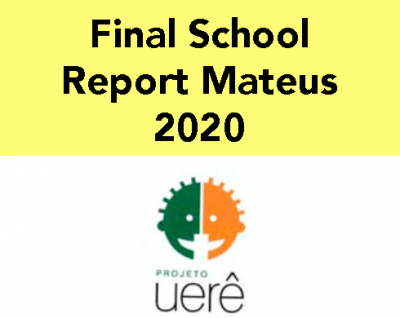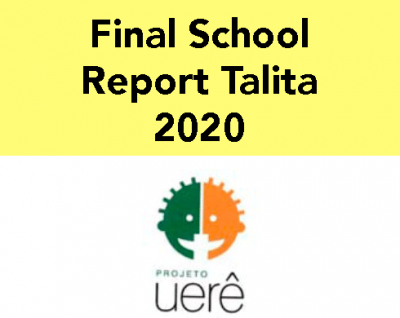Annual Report 2020
(Excerpt: For the complete report please write to Epona-Stiftung für Pferd und Umwelt c/o Mermagen, Kesselstr. 15, 53797 Lohmar)
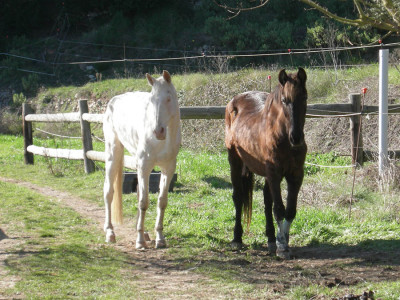
We too suffered a loss this year. Our beloved Ella died on December 10th, 2020. Her legs, weakened by numerous tendon injuries, no longer supported her, and the pain had made her emaciate. She was almost 30 years old. Before she came to the Epona Foundation, she had worked for many years as a school horse, wedged between ill-fitting saddles and reins. That hard work and the numerous foals she had given birth had weakened her abdominal muscles and caused a sway back. In 2015 Ella suffered severe tendonitis from which she never fully recovered. Wir beerdigten sie neben ihrem treuen Gefährten Brill, der im Januar 2016 gestorben war (see annual report 2016). We thank you, Ella, for everything you have given and taught us. You will always live in our hearts.
After a year in La Corona (see annual report 2019) we returned to Sora in the summer, to Mercès Hof Mas Casanova. La Corona was not suitable for our horses, who all need special care. Kosmos had numerous eye injuries. Due to constant changes of pasture he was often disoriented and injured himself on the low, prickly bushes. For Aloha, with her hoof problems, the fat grass was poison. We took them out of the herd and integrated them into the pony herd that stood on poor soil. But Aloha was not happy there.
Our pony Cookie also had a serious eye injury and almost lost his eyesight. The ophthalmologist Dr. Simó saved Cookie’s eye through a difficult operation. Cookie spent almost a month in the clinic, where he got along so well that he quickly won the hearts of doctors and staff. Back in Sora he took up his life as a loner again, went first through the small river to the other side of the area, where he found his favorite place, the cave, right away.
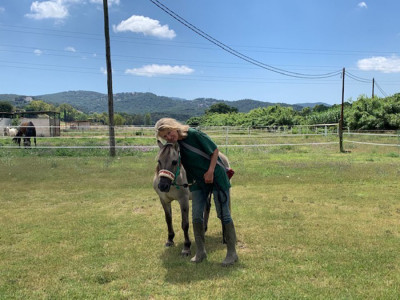
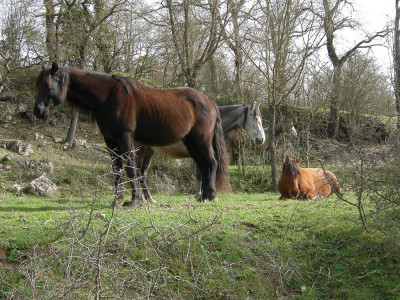
Toni helped us with the transport, which went without any problems. When the horses arrived in Casanova / Sora, they stopped at first, that sounded familiar to them. And then the joy was great to be "home" again. All Epona horses, including the two ponies Tobby and Cookie, are now together on the property, which is in the valley of the finca. The pastures are separated by a small river that is fed by spring water. One half is more grassy, the other half is more wooded and offers cool shade, especially in summer. Opposite these pastures are further pastures and wooded areas to change from time to time so that the grazed pastures can relax.
Four new horses in the Epona family
When we arrived there were five horses, four mares and a gelding in the pastures. The four mares, two mother mares with their young horses, belonged to a group of seven mares, two stallions and one donkey that Mercè had taken in in July 2019. They had an odyssey behind them. In 2017, the town hall of the small Catalan town of St. Jaume dels Domenys received several information and notifications that reported bad treatment of horses on a farm. Everything is very dirty, the animals do not have enough to eat and are often mistreated. The town hall took action and found accommodation for the horses on a riding stables. The community paid the grossly inflated pension of 300 euros per horse every month and trusted that they would be well housed there until people were found to adopt them. Unfortunately, it was not like that. The owner took advantage of the parishioners' ignorance, collected the money, locked the animals individually, including the foals separate from their mothers, in boxes and occasionally threw hay into the stables. The fraud was discovered after two years. The horses were freed and brought to Sora. The owner of the riding stables tried to prevent his loss by describing the horses as extremely difficult and aggressive. They were in a sorry state. Some of the hooves curved up because they had not been cut, the animals had no muscles because they could not move. One foal was unable to walk.
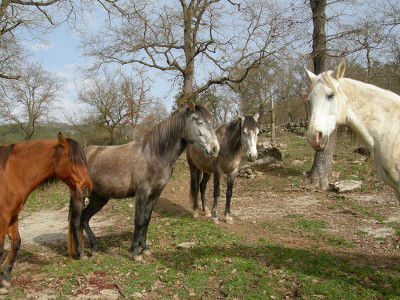
Mercè, Toni and Anna nursed the animals with a lot of love and patience. Hooves have been expertly trimmed. The stallions were neutered and slowly they were accustomed to more extensive terrain from the limited paddock. The young horses did not leave their mothers' sides. When we arrived in Sora, the search for people who wanted to take over the horses was in full swing. Mercè reported that many had contacted us, but after careful research it often turned out that they were horse traders or owners of riding businesses that were not recommended, people who wanted to make a profit from the horses. It was also clear that the animals would be separated again, because private individuals who could take over two or even four horses are rare, especially in difficult times like 2020. The Epona Foundation for Horses and the Environment consulted briefly and then made a decision to take over the four horses. Especially in light of the fact that some horses of the Epona family had died in recent years: Kam and Calin, Chicas as well as Brill and Ella.
Much to learn
When we arrived in Sora, Anna also greets us. In 2019 she had also taken her horse to Mercè. At that time our horses were standing together in a pasture and Anna's mare had made friends with Indhu. Now we met Anna again. She helped raise the two young horses Triana and Titia free of charge. She had established the contact between the town hall of St. Jaume dels Domenys and Mercè. After the four mares had been accepted into the Epona family, we asked Anna if she wanted to continue working with the horses. She wanted. She comes three times a week and trains Titia and Triana in the round pen, goes for a walk with them, plays the seven games with them, has taken away their fear of running water, teaches them to walk on the lead, pick up their hooves, and have confidence and showed them that people can communicate with them too. Thank you Anna.
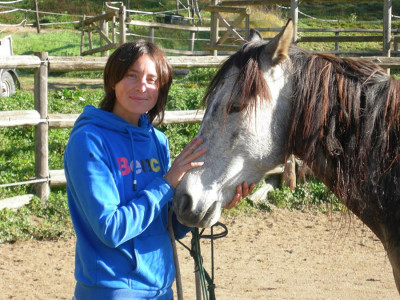
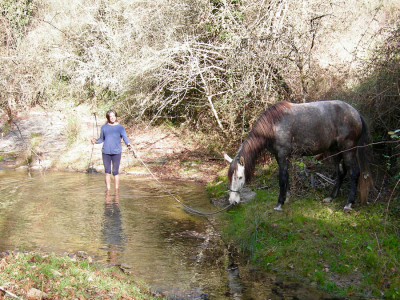
Annie Hasemanns, International Program Adviser Projeto Uerê, reports on Uerê and the situation in Brazil in the year of Covid 2020
For the first lockdown in Brazil in March / April 2020, the Uerê project also had to close. The children who attended private schools had classes online, but the children in public schools were unable to attend classes. To date, at the beginning of 2021, most of the public schools are closed. This is a real disaster for the children. How are they supposed to catch up when classes resume. I fear that there will be a lot of drop-outs, especially in the slums.
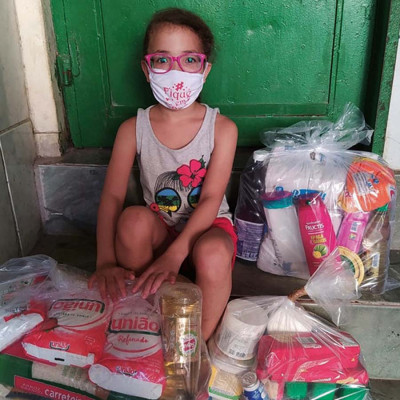
Yvonne, founder and head of the Projetos Uerê, had taught from home via Zoom at the beginning of the lockdown, but not all children in the poor district have an Internet connection, a reasonable cell phone or a tablet. Towards the end of the second half of the year, the children in the private schools were able to go back to their classes. The project has reopened since February 2021 - with a reduced number of children and a strict hygiene concept.
Many people in the slums lost their jobs (cleaning women, housekeeping, kitchen help, construction workers or beach vendors). The families were in dire need. In mid-2020, Yvonne started raising money to help impoverished families of Uerê children with monthly grocery packages. State support is only very sporadic, and it is only a drop in the ocean. Sometimes people queued at Uerê who had nothing to do with the project, such as an old woman who hadn't received her small pension for three months. She had nothing to eat and asked if it would be possible to get a bag of rice from Uerê. Many people were helped with food parcels. Some women had tears in their eyes because they would not have known how they could have put something on the table without Uerê's help.
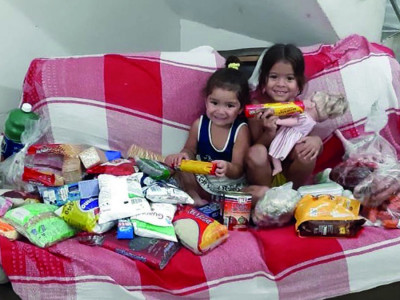
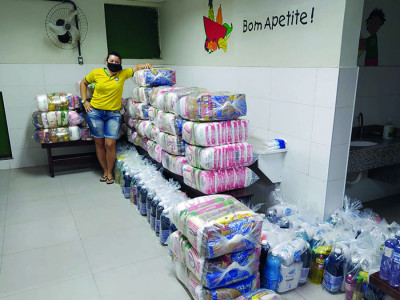
It doesn't look like the situation in Brazil will change anytime soon. With too little testing, the true extent of the pandemic is unknown. Even people who die with typical Covid symptoms are not included in the statistics if they have not been tested. It is estimated that the true number of illnesses and deaths from Covid is at least two to three times as high as officially reported. President Bolsonaro, still denies the pandemic, rejects masks and wants all shops to stay open and people to go to the beach and the restaurant. He puts the economy first and reacts indifferently when the high death rate is held against him. Health ministers and governors who oppose him will be dismissed and replaced by ethos.
Some senators got together and bought a few million doses of vaccine to help, but it was too little and too late. Hospitals are overcrowded and up to 80% of intubated patients die. There is a lack of suitable medication and oxygen. Many younger people also lose their lives because the Manaus mutation is much more aggressive.
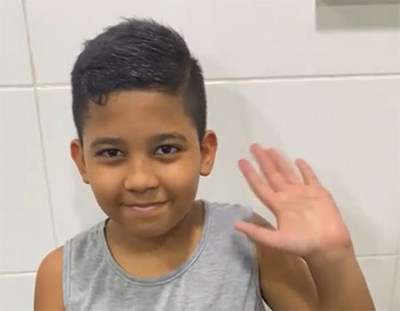
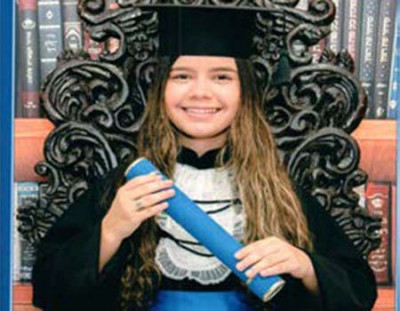
We are proud and happy about the development of Matheus and Thalita. Matheus finished his fifth year with very good grades and Thalita got a very good graduation at the end of her school days.
Anni Haemanns reports about Eritrea, where the Epono Foundation is supporting the donkey project since 2012 ( see annual reports since 2012)
Unfortunately, Eritrea could not be visited in 2020 because the Covid-19 virus was also rampant in the East African state. The Ministry of Health had closed the airport in Asmara early and foreigners could no longer get visas. Life came to a standstill across the country. There were no buses, no trucks with goods from neighboring countries. Schools and shops were closed. There are new infections mainly from local travelers who wanted to return to their country across the green border. They all had to be in a quarantine hotel for 14 days. If they were symptom free, they could go home. The sick were treated in the hospitals. Officially, the death rate is very low. We learned that some hospitals were only half open because doctors and hospital staff were also ill. In addition, there was another plague of locusts in Eritrea in 2020, which is also why there is too little food for people and animals.
We will only be able to enter when the airport is open again and we can show a vaccination. Maybe that will be in the course of 2021. The donkey project will continue as soon as we can be back on site.
